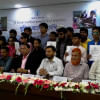Marrakesh Treaty: Progress still elusive for the visually impaired

In September last year, Bangladesh celebrated its accession to the Marrakesh Treaty. On December 26, 2022, the agreement entered into force in Bangladesh, three months after the submission of the letter of ratification to the World Intellectual Property Organization (WIPO) headquarters: a remarkable milestone for visually impaired, blind, and print-disabled individuals. The Marrakesh Treaty aimed to alleviate the "book famine" by facilitating access to published works, offering hope to millions who were previously excluded from the literary world. However, a year later, it is disheartening that the fervour surrounding the ratification has not translated into significant progress for the intended beneficiaries in Bangladesh.
The accession to the treaty created much optimism amongst print-disabled individuals and organisations such as Visually Impaired People's Society (VIPS), who have long demanded Bangladesh's ratification to the treaty and also amendments to the Copyright Act, 2000. However, the delay in amending the act is a significant roadblock to realising the impact of the Marrakesh Treaty, as it leaves our visually impaired community in a legal limbo.
Bangladeshi media's lack of coverage of the crucial event last year also mirrors the persistent indifference towards disability rights in the country. Unfortunately, this apathy extends beyond headlines, with little tangible change for those eagerly anticipating the benefits promised by the treaty.
The treaty, administered by the WIPO, was designed to ease the production and international transfer of specially-adapted books for people with visual impairments. It established exceptions to traditional copyright laws, allowing access to printed works in accessible formats like Braille and digital audio files. But the "book famine" remains a pressing issue, with millions of visually impaired individuals worldwide still lacking access to printed materials in accessible formats. The Nationwide Blindness Survey 2020 found that in Bangladesh, an estimated 14.3 million people are living with mild to severe visual impairment, and 1 in every 100 adults aged 30 years or older suffers from any degree of visual impairment.
Clearly, it is crucial to move beyond symbolic gestures and focus on practical implementation without further delay. Visually impaired children and adults have long been denied equal opportunities in Bangladesh and elsewhere. Additionally, the lack of awareness and understanding of the treaty among the general public, government officials, and even the media poses a significant obstacle to its successful implementation.
As a new parliament takes shape in January 2024, there is a chance for Bangladesh to demonstrate its commitment to inclusivity by swiftly approving the amendment to the Copyright Act. This strategic move would not only align the national legislation with international standards but also signal the country's dedication to ensuring that the visually impaired can fully reap the benefits of the Marrakesh Treaty.
The Marrakesh Treaty holds the potential to yield far-reaching benefits that extend well beyond the realm of literature accessibility. The treaty can play a pivotal role in fostering a knowledge-based economy by empowering visually impaired individuals with access to a wealth of information. When people with visual impairments can independently access literature, research materials, and educational resources, it not only enriches their personal knowledge but also enables them to actively participate in academic pursuits and contribute to various fields. This inclusion in the knowledge economy can lead to the creation of a diverse and skilled workforce, promoting innovation and driving economic growth.
Plus, by ensuring that visually impaired individuals have unhindered access to a wide range of materials—including legal documents, government publications, and other information sources—the treaty can promote an environment where citizens, regardless of visual ability, can stay informed about and engaged in public affairs. This inclusivity promotes transparency in governance and empowers these individuals to actively participate in civic activities.
Finally, when visually impaired individuals can access the same information as their sighted counterparts, it challenges preconceived notions and fosters a more inclusive societal mindset. This increased awareness can reduce stigma and discrimination against people with disabilities, promoting a culture of inclusivity and respect for diversity.
The one-year anniversary of Bangladesh's accession serves as a critical juncture for reflection and action. The time has come to bridge the gap between promises and reality—to make literature accessible to all, regardless of visual ability. The urgency for action is underscored by the imperative need to amend the Copyright Act, 2000. The act, enacted more than two decades ago, has become outdated and fails to encompass the necessary exemptions required for the visually impaired community to fully benefit from the treaty. Despite the critical nature of this amendment, it is regrettable that the necessary legislative changes have not been implemented in a timely manner. As the visually impaired community continues to wait for justice, let us collectively strive to end the book famine and ensure that the Marrakesh Treaty's potential is fully realised in Bangladesh.
Ayon Debnath is a development practitioner currently working with the Royal Commonwealth Society for the Blind-Sightsavers as campaign adviser. He can be reached at [email protected]
Views expressed in this article are the author's own.
Follow The Daily Star Opinion on Facebook for the latest opinions, commentaries and analyses by experts and professionals. To contribute your article or letter to The Daily Star Opinion, see our guidelines for submission.

 For all latest news, follow The Daily Star's Google News channel.
For all latest news, follow The Daily Star's Google News channel. 











Comments